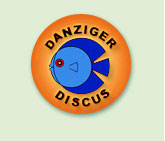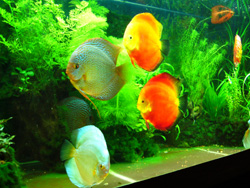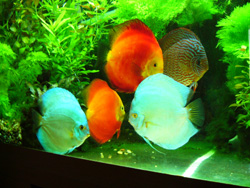
 |
|
Purchase of Discus & Combining them in Aquariums
When one is interested in purchasing discus, it is important to note that it is swimming alertly and that the discus is in search for food. This is important especially when the discus is young. An eating discus is a healthy discus. Ask the shop owner to give the discus some food and watch to see if this is indeed the case. If it is possible to see the color of the excrement then it should be a brown reddish/black shade that indicates a healthy digestive system. Note if the body color is not too dark (of course depending on the type). The Discus should be shaped round with open fins, and have a vital appearance if fins are closed (you should check this before the net is put in and the discus is not under stress). Discus swim in groups (except for the time when they want to reproduce, then they split into pairs). Therefore it is advisable to put a minimum of two discus especially if there are already a few discus in the aquarium. The number of discus in the aquarium is calculated so that each adult/ mature discus has a living space of 30-60 liters of water.   Discus in an aquarium with plants is a fascinating and a beautiful sight, but can be a bit complicated. Discus inherently need warm water; while plants usually thrive in water that is not warm. The compromise should favor the discus and temperature should be not less than 280C. It is possible to find suitable plants for warm water such as the Anobia family. Discus are very sensitive to change in pH levels; so if you are using a CO2 device system it can be problematic since the carbon dioxide raises the acidity level. If there is an abrupt change in the level of carbon dioxide it would then harm the fish. Additionally, it is advisable to put discus of more than 10 cm. in a plant aquarium since that from this size on, the requirement for food decreases and there is no danger in harming the chemical / biological balance in the aquarium that will cause forming of seaweed / alga. The fish group of the Tetra family such as the Red Nosed Tetra, the Cardinal Tetra, the Bleeding Heart Tetra and etc. would be good partners for the discus in the plant aquarium. As for a cleaning team, the Golden 'Shmerla' / Albino would do a great job and won't be a bother to the discus. Be ware of the Ottocinklus and the Flying Fox that might find the discus' mucous layer a preferable choice for food. |